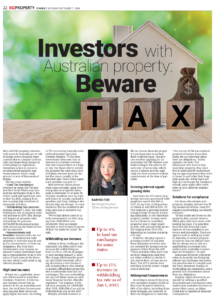Overseas Property Investors – Beware of high taxes (by Karina Foo)
Overseas Investors with Australian property – Beware of taxes (Read our article that appeared in The Star Publications, Malaysia).

Click here to Download the article from The Star Publications: Overseas Property Investors beware of Australian taxes
Text from article:
Investors with Australian property: Beware of Australian Taxes
By Karina Foo
MALAYSIAN property investors
with assets in Australia are at risk
of facing severe financial reper
cussions due to complex land tax
rates and impending changes in
withholding tax regulations.
Immediate action is crucial to
avoid potential penalties and
reassessments, which could
amount to tens of thousands of
dollars.
The key areas include:
• Land Tax Surcharges:
Investors in states like Victoria
and New South Wales may face
land tax surcharges of up to 4%,
which could add significant costs
to their tax bills, ranging from
tens to potentially hundreds of
thousands of dollars.
• Withholding Tax Increase:
Starting January 1, 2025, the with
holding tax rate on property sales
will increase to 15%. This change
will impact all property sales,
eliminating the previous
A$750,000 threshold and poten
tially increasing the financial bur
den on investors.
• Reassessments and
Penalties: Investors who are not
Australian residents but hold
property in Australia may be sub
ject to reassessments of their tax
obligations. The local State
Governments may reassess an
investor’s status, potentially lead
ing to reassessments of up to five
years of back taxes at the absen
tee rate, which could result in sig
nificant penalties.
High land tax rates
If land tax is applicable, inves
tors will be taxed as Australian
residents.
However, if informa
tion sharing reveals that an
investor is not an Australian resi
dent, the local State Government
may reassess their status and
apply higher tax rates. According
to TJD Accounting Australia inter
national taxation specialist
Dominic Murphy: “If the State
Government discovers that an
investor is a resident overseas,
they will reassess them at a high
er rate. For those who’ve owned
the property for some time, they
will likely reassess them for the
last five years, usually at the
absentee rate. That’s when signif
icant penalties can kick in.”
State revenue offices assess
these taxes annually using own
ership data as of specific dates,
such as December 31 or June 30.
Payment deadlines vary by state,
and failure to comply can lead to
penalties and fines, adding to the
already high tax charges. In some
instances, this has resulted in dis
tress sales due to excessive tax
liabilities.
“We’ve had clients come to us
with reassessment tax bills rang
ing from A$60,000 to over
A$100,000. They are simply
shocked as they’ve been unaware
of their tax status for years,” he
said.
Withholding tax increase
Adding to these challenges, the
Australian Tax Office (ATO) will
increase the withholding tax
from 12.5% to 15% on all proper
ty sales starting January 1, 2025.
This change eliminates the previ
ous A$750,000 threshold, affect
ing all investors who choose to
sell, including those who attempt
to quickly offload their properties
due to unbearable land tax and
surcharges. The new withholding
tax rate will likely create an addi
tional financial burden.
Murphy
explained: “For instance, if you
sell your property for A$600,000
after 2024, A$90,000 of tax will be
withheld from you by the ATO.”
Murphy advised investors to
file tax returns from the proper
ty’s purchase date to reclaim
these withheld taxes. This pro
cess involves applying for an
Australian Tax File Number and
backtracking to file returns for
each year of ownership, which
can be a tedious process, espe
cially for those unaware of these
requirements at the time of pur
chase.
Growing interest equals
growing risks
Data from the ATO shows that
foreign investors purchased 5,360
properties worth A$4.9bil in
2022–23, up from 4,228 purchas
es valued at A$3.9bil in 2021–22.
This indicates a growing interest
among foreign investors, includ
ing Malaysians, in the Australian
property market. Foreign inves
tors are drawn to Australian
properties due to their steady
growth, with annual yields gener
ally ranging from 3% to 8%,
depending on location and prop
erty type.
However, Murphy reports a
growing number of inquiries
from Malaysian investors who
are confused by unexpected tax
payment letters from the ATO.
“These investors often don’t real
ize their obligations until they
are either audited or decide to
sell, and by then, all eyes are on
them. The ATO’s precise data
matching systems ensure compli
ance is essential.”
Widespread Unawareness
According to research by prop
erty consultant Stephen Bailey of
Blue Crest Property Solutions,
94% of his clients, including those
from Malaysia, are unaware of
their tax obligations in Australia.
“Our survey of 218 non-resident
property investors shows that
many are not informed about
their tax obligations,” Bailey
explains.
He adds, “For
Malaysians who want to buy
Australian property, they must
first be informed by understand
ing the type of property they want
to invest in and what their long
term goals are. While there are
high tax surcharges for foreigners
overall, some states offer lower
rates or have different require
ments.”
Solutions for compliance
For those who already own
property, Murphy advised that fil
ing annual tax returns, even if it
requires backtracking, can benefit
investors.
“If they made any losses on the
property, they can use those to
offset gains and claim more with
holding tax back. I’ve seen first
hand that the financial conse
quences of non-compliance are
severe and immediate. There are
options such as setting up trusts
in Australia or certain property
structures that can reduce taxes.
But it’s always best to talk to a
qualified tax accountant who
understands Australian taxation
laws for foreigners,” he said.
Malaysian investors with prop
erties in Australia are facing sig
nificant tax challenges and poten
tial penalties due to complex land
tax rates, imminent changes in
withholding tax regulations, and a
general lack of awareness about
their tax obligations.
Murphy urged investors to act
quickly by seeking a qualified
accountant and conveyancer who
understand Australian tax laws to
protect their assets, as delays
could lead to significant financial
consequences
Read our article here for more about the new tax changes coming in 2025 that will affect your properties: https://tjdaccounting.com.au/overseas-property-investors-australia-face-complex-tax-challenges/
